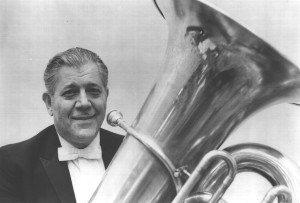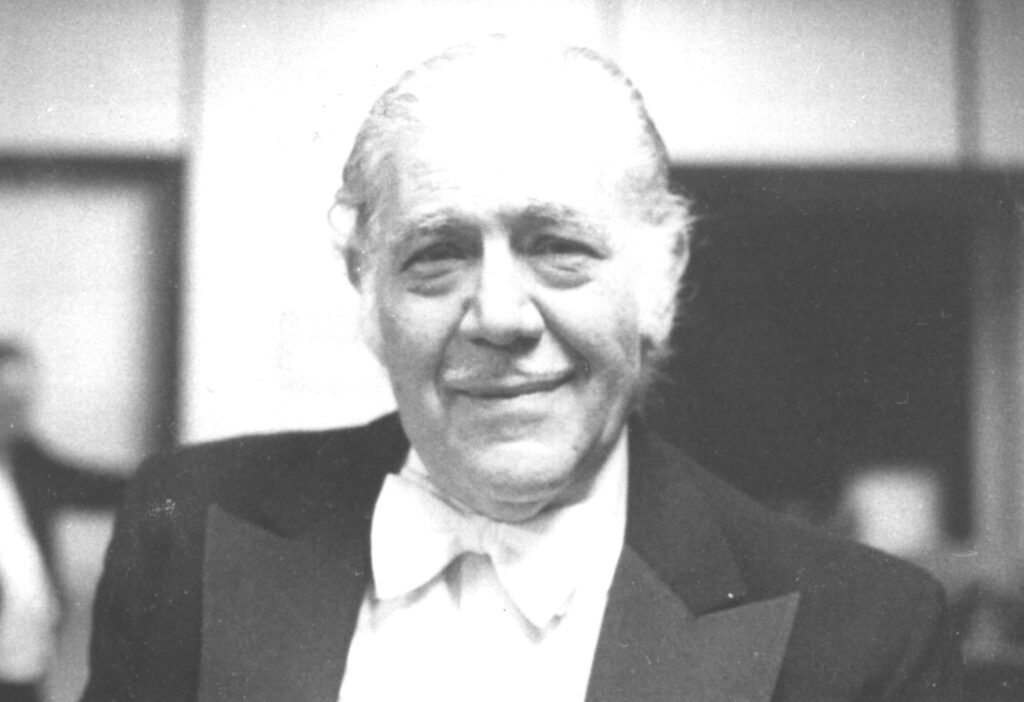The Performer
Arnold Jacobs was born in Philadelphia on June 11, 1915 but raised in California. The product of a musical family, he credits his mother, a keyboard artist, for his initial inspiration in music, and spent a good part of his youth progressing from bugle to trumpet to trombone and finally to tuba. He entered Philadelphia’s Curtis Institute of Music as a fifteen-year-old on a scholarship and continued to major in tuba.
After his graduation from Curtis in 1936, he played two seasons in the Indianapolis Symphony under Fabien Sevitzky. From 1939 until 1944 he was the tubist of the Pittsburgh Symphony under Fritz Reiner. In 1941 Mr. Jacobs toured the country with Leopold Stokowski and the All-American Youth Orchestra. His was a member of the Chicago Symphony from 1944 until his retirement in 1988.
During his forty-four year tenure with the Chicago  Symphony, he took temporary leave in the spring of 1949 to tour England and Scotland with the Philadelphia Orchestra. He was on the faculty of Western State College’s Music Camp at Gunnison, Colorado during the early 1960’s. In June 1962, he had the honor of being the first tuba player invited to play at the Casals Festival in Puerto Rico. Mr. Jacobs, along with colleagues from the CSO were part of the famous 1968 recording of Gabrieli’s music with members of the Philadelphia and Cleveland Orchestras. He was also a founding member of the Chicago Symphony Brass Quintet, appeared as a soloist with the CSO on several occasions, and recorded the Vaughan Williams Concerto for Bass Tuba and Orchestra with Daniel Barenboim conducting the Chicago Symphony. In recognition of his outstanding career, in 2001, the Chicago Symphony’s tuba chair was dedicated as the Arnold Jacobs Principal Tuba Chair, Endowed by Christine Querfeld.
Symphony, he took temporary leave in the spring of 1949 to tour England and Scotland with the Philadelphia Orchestra. He was on the faculty of Western State College’s Music Camp at Gunnison, Colorado during the early 1960’s. In June 1962, he had the honor of being the first tuba player invited to play at the Casals Festival in Puerto Rico. Mr. Jacobs, along with colleagues from the CSO were part of the famous 1968 recording of Gabrieli’s music with members of the Philadelphia and Cleveland Orchestras. He was also a founding member of the Chicago Symphony Brass Quintet, appeared as a soloist with the CSO on several occasions, and recorded the Vaughan Williams Concerto for Bass Tuba and Orchestra with Daniel Barenboim conducting the Chicago Symphony. In recognition of his outstanding career, in 2001, the Chicago Symphony’s tuba chair was dedicated as the Arnold Jacobs Principal Tuba Chair, Endowed by Christine Querfeld.
From Arnold Jacobs: Song and Wind*
On September 29, 1988, Jacobs performed one of his final concerts with the Chicago Symphony. On that night, he was awarded the Theodore Thomas Medallion along with fellow retirees Leon Brenner, Samuel Feinzimer, Isadore Zverow and Donald and Margaret Evans. Jacobs thanked the audience for the years of support they had given him. Solti walked off the stage with his arm around Jacobs telling him, “I hope that this gives you enough energy to complete the season,” as a replacement had not yet been found. Jacobs, in fact, finished the subscription series, completing his career as a performer.
“Oh, I will miss my colleagues—my musical family. It’s a privilege to play with this great orchestra and brass section, it really is. I feel very fortunate to have been a part of it.”
He has moved from “One of the best seats in Orchestra Hall,” on the stage, to a seat in the audience. For years Mrs. Jacobs had a season ticket for Thursday night concerts. They bought the seat next to hers and he regularly attended Thursday night concerts.
“I look back on those years with really great pleasure. It was so nice to have a job that when you wake up in the morning, you feel like going to work. You are anxious to sit down, get the horn out, join your colleagues and make some great music. I did have that.
“Most of my life was based on professional playing, and enjoying it thoroughly. I miss it very much today. But we do have seats in the balcony of Orchestra Hall, and I see my colleagues performing. I feel a little strange about it sometimes because I feel I belong on the stage and not off. My horn is still there representing me. I sold it to the orchestra before I left, and Mr. Pokorny, the very fine tubist that they have today, enjoys it so much—he’s playing it now. So, I feel a little bit of me is still on the stage.”

*Arnold Jacobs: Song and Wind, Copyright 1996 Windsong Press, Ltd., All rights reserved.
